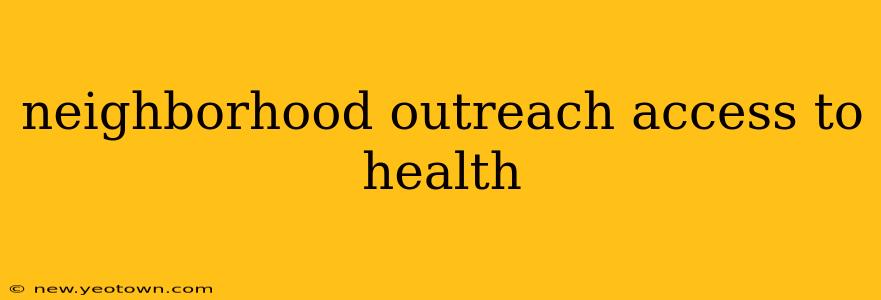The hum of city life often masks a stark reality: unequal access to healthcare. While some neighborhoods boast state-of-the-art medical facilities, others struggle with limited resources, leaving vulnerable populations behind. This is where neighborhood outreach programs step in, acting as vital bridges connecting communities with the healthcare they need. This isn't just about delivering services; it's about building trust, fostering understanding, and empowering individuals to take control of their health.
My journey into the world of neighborhood health outreach began several years ago, witnessing firsthand the impact of these programs on individuals and entire communities. From mobile clinics parked on dusty streets to community health workers navigating complex social landscapes, I've seen the dedication and ingenuity required to bring healthcare to the doorstep. This isn't a simple task; it requires understanding the unique challenges faced by each neighborhood.
What are the barriers to healthcare access in underserved neighborhoods?
This is a critical question, and the answer is multifaceted. It's not simply a matter of distance to a hospital. Many factors intertwine to create significant barriers:
-
Lack of Transportation: For many, reaching a clinic or hospital requires reliable transportation, which can be unaffordable or unavailable in underserved areas. A simple bus ride can be a significant hurdle, especially for individuals with mobility issues or those caring for young children.
-
Financial Constraints: Healthcare costs can be overwhelming, even with insurance. Co-pays, deductibles, and prescription medications can create insurmountable financial barriers, forcing individuals to delay or forgo necessary care.
-
Language Barriers: Communication is key in healthcare. Language barriers can create misunderstandings and prevent individuals from receiving proper care, leading to delayed diagnoses and treatment.
-
Cultural Differences: Different cultures have diverse health beliefs and practices. Effective outreach programs must be culturally sensitive and adapt their approach to meet the unique needs and preferences of each community.
-
Lack of Awareness: Some individuals may not be aware of available resources or how to access them. Outreach programs play a crucial role in educating communities about healthcare options and available support.
-
Mistrust of the Healthcare System: Past negative experiences or a lack of trust in healthcare providers can create significant barriers to accessing care. Building rapport and trust is essential for successful outreach efforts.
How do neighborhood outreach programs improve healthcare access?
Neighborhood outreach programs address these challenges head-on through various strategies:
-
Mobile Clinics: Bringing healthcare directly to the community, often overcoming transportation barriers. These clinics offer basic medical care, screenings, and health education.
-
Community Health Workers: These individuals are trusted members of the community who act as liaisons between healthcare providers and residents. They provide education, support, and assistance with navigation of the healthcare system.
-
Health Education and Promotion: Workshops, classes, and community events educate residents about health risks, preventative measures, and available resources.
-
Translation and Interpretation Services: Ensuring effective communication between providers and patients who speak different languages.
-
Culturally Competent Care: Tailoring healthcare services to meet the unique cultural needs and beliefs of the community.
-
Addressing Social Determinants of Health: Recognizing that factors such as poverty, housing, and food insecurity significantly impact health, outreach programs often connect individuals with resources to address these needs.
What types of services are commonly offered through neighborhood outreach?
The services offered vary depending on the specific needs of the community, but common offerings include:
-
Preventive Care: Screenings for high blood pressure, diabetes, cholesterol, and cancer. Vaccinations and health education.
-
Basic Medical Care: Treatment for minor illnesses and injuries.
-
Mental Health Services: Counseling and support for mental health concerns.
-
Chronic Disease Management: Support and education for individuals managing chronic conditions like diabetes and heart disease.
-
Substance Abuse Treatment: Referrals and support for substance abuse issues.
-
Health Insurance Enrollment Assistance: Help navigating the complexities of health insurance enrollment.
What is the role of community health workers in neighborhood outreach?
Community health workers are essential to the success of neighborhood outreach programs. Their intimate knowledge of the community and their trusted relationships with residents allow them to effectively bridge the gap between healthcare providers and those who need care. They often:
-
Identify individuals in need of care: By building relationships and understanding the community's dynamics, they can identify those who may be hesitant or unable to access care independently.
-
Provide health education and support: They educate individuals about health risks, preventative measures, and available resources, offering personalized guidance.
-
Navigate the healthcare system: They assist individuals with scheduling appointments, filling out forms, and understanding medical information.
-
Advocate for their community: They represent the needs of their community to healthcare providers and policymakers.
Neighborhood outreach programs are critical in ensuring equitable healthcare access. By addressing the unique challenges faced by underserved communities and building trust through culturally competent and community-centric approaches, we can create healthier and more equitable neighborhoods for all. The stories of resilience and the positive impacts witnessed firsthand are a testament to the transformative power of community-based healthcare.

